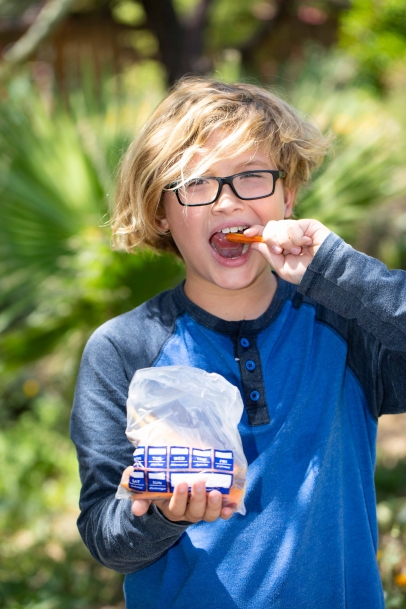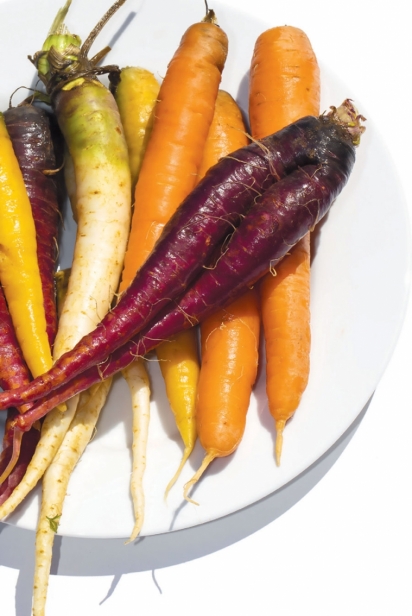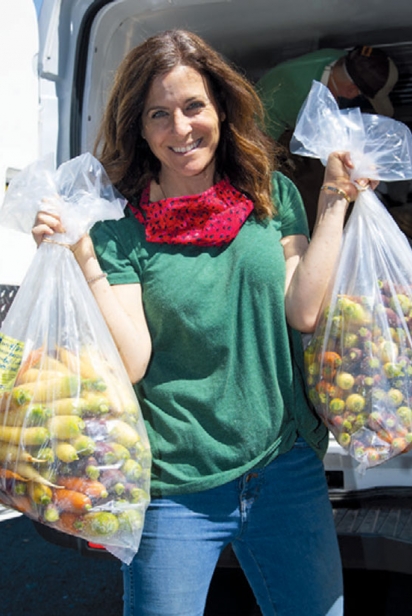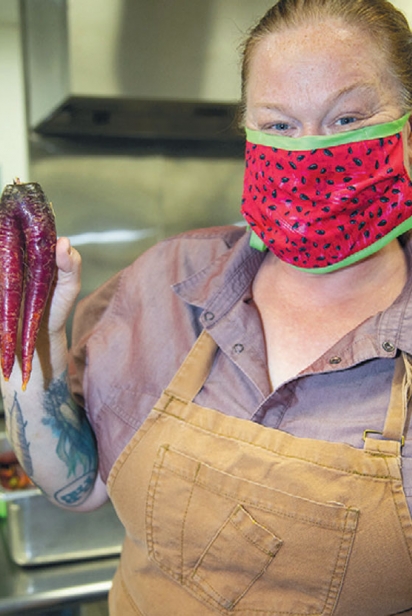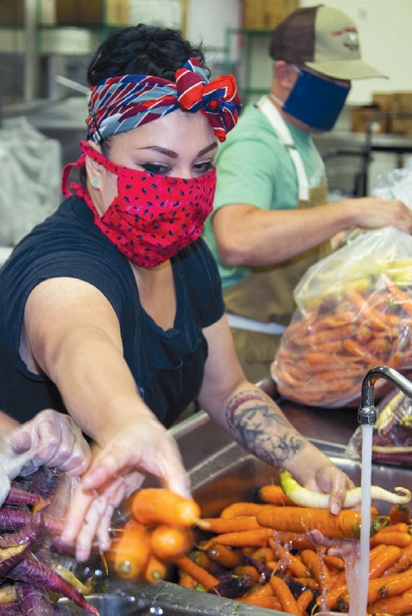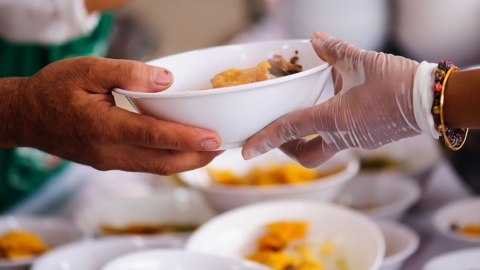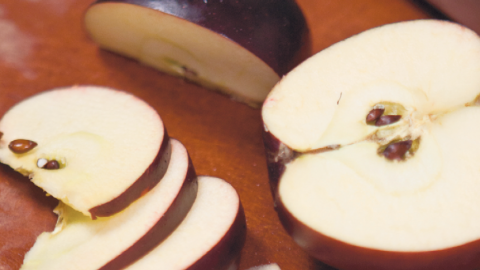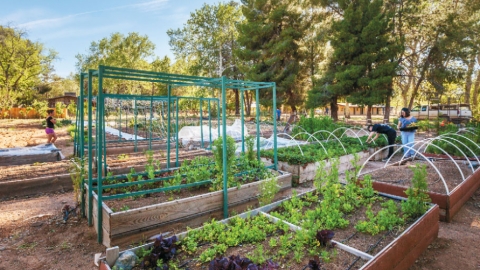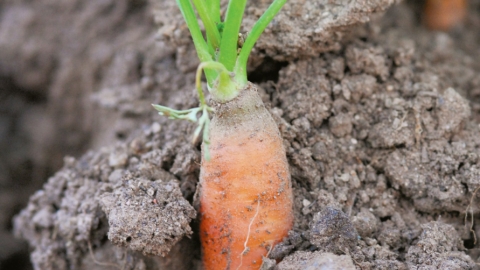5,000 Pounds of Carrots. 50,000 School Kids.
How Valley Food Advocates United to Champion Local Food Despite the Pandemic
The sun had already set on an unseasonably hot April evening when James Beard Award–winning chef Charleen Badman packed up her knives after a 10- hour day.
She wasn’t leaving after a shift preparing dishes like spicy grilled broccoli with Meyer lemon aioli and roasted beefsteak tomato with sumac, quark and dukka at her Scottsdale restaurant FnB. Instead, she’d spent the day processing 1,250 pounds of locally grown rainbow carrots in a Phoenix Elementary School District commercial kitchen.
The bagged carrot sticks would go out to hundreds of school children around the city in the coming days.
“There was something very satisfying when we finished,” Badman recalled. “We were, like, ‘That’s a lot of bags of carrots and that’s a lot of kids that are going to get fresh food that they’re maybe not getting right now.’ They’re getting something fresh, and they’re getting something local.”
The project was an initiative of Arizona’s Farm to School Network and had been in the works for months—then the pandemic hit. With many school cafeterias shuttered due to COVID-19, organizers were unsure how to get the massive harvest of rainbow carrots cleaned and cut for students to eat since the schools were no longer serving hot lunch and salad bars.
That’s where Badman and her Blue Watermelon Project stepped in. Like many restaurateurs around the Valley, Badman had closed the doors to her restaurant in early March due to concerns over the spread of COVID-19. So instead of sitting idle, she called on the Blue Watermelon Project, a coalition of top metro Phoenix chefs, restaurateurs, farmers and community food advocates, to rally behind the program to get local produce into schools.
Lending a hand not only helped get fresh vegetables to thousands of children, it also gave Badman purpose and hope during the global health crisis.
“The big thing is that our purpose for the Blue Watermelon Project is to help feed children better food, and this was planned even before the shutdown,” Badman said. “But I really feel like instead of us sitting there with schools closed and restaurants closed, this is a way for us to have an impact.”
It’s no small feat to pull 5,000 pounds of carrots from the ground, not to mention to wash, prep and distribute them to thousands of students across five school districts in metro Phoenix. Throw in a global pandemic and it could have been a recipe for disaster.
But over three weeks in April and May that’s exactly what Valley farmers, school food professionals and public health experts did.
Thanks to a collaboration between organizations including the Arizona Farm to School Network, Sun Produce Co-op and Blue Watermelon Project, some 50,000 school-age students in the Valley got a taste of locally grown produce in their curbside meal pickups. The thousands of pounds of rainbow carrots were grown by small farmers around the Phoenix area including Maya’s Farm, Pinnacle Farms, Agritopia and Blue Sky Organic Farms. They went into free sack lunches offered to children by schools in Osborn, Phoenix, Cartwright, Tempe and Issac elementary school districts.
Ashley Schimke, Farm to School program specialist for the Arizona Department of Education, says the project underscored the ability of the local food community to come together behind an important cause: getting more Arizona- grown food into schools.
“One of the beautiful things about the carrot project is it’s an example of the network coming together to solve something,” Schimke said.
“To me, it’s a wonderful example of the community being strengthened around adversity and I think we have a stronger and brighter future for farm to school moving past the pandemic.”
What is the Arizona Farm to School Network?
Schimke has been a driving force behind efforts to get more local produce into schools since being hired to head up the Farm to School program in Arizona in 2011.
The program, which falls under the Arizona Department of Education, is a core partner with the National Farm to School Network and works to further the national organization’s mission to “bring local food sourcing, school gardens and food and agriculture education into schools and early care and education settings” in Arizona.
“It really takes all three things to give this holistic picture of food and food in schools,” Schimke said.
To that end, last year Schimke made strides to harness the power of “grassroots or community-level people” by forming working groups to zero in on each of the network’s three areas of focus. In the coming months and years, Schimke hopes to broaden the engagement points for the public and expand the network’s resources for educators around the state.
The carrot project came out of the network’s procurement and purchasing work group co-chaired by Jillian Feltham, child nutrition education coordinator for Osborn School District. Feltham described the carrot project as a way to test the local food system’s ability to work with school districts.
“It sort of came out of this idea that it’s really easy to make a blanket statement like ‘We should have more local food in schools,’” Feltham said. “Sure, everybody agrees that’s a good statement. But when you look at the details, it’s just so complicated.”
Learning how small farmers can work with schools
To make the project happen, the Farm to School Network partnered with Sun Produce Co-op, which describes itself as “a multi-stakeholder agricultural and marketing organization that includes agricultural producers, distributors, buyers and market specialists.” The organization helps small Phoenix area growers find viable distribution models, coordinate production and leverage the group’s size for marketing efforts.
Cindy Gentry is the co-op president and has worked in local food systems for decades. She says the co-op is crucial for a community that historically has struggled to work collaboratively.
“Smaller-scale growers have worked very much on their own and very much see each other as competition,” Gentry said. “They don’t really have time to do much else except look out for their own farm. So the concept for working together and building relationships of trust among the farmers has been amazing to see.”
Partnering with the Farm to School Network to get local farmers’ products into schools fulfilled a dream she’s harbored for years, Gentry said.
The co-op helped the small farmers overcome some of the logistical barriers around growing a high volume of carrots for a contract client including when to plant seeds, when to harvest and how to get the produce from the farms to the schools for processing. It also stepped in to help alleviate potential issues for the school districts.
“I think what’s unique about the opportunity is the barriers that people have said about farm to school are ‘We don’t know who the farmers are,’ ‘We don’t know how to chase them down’ and ‘We’re concerned about the price.’ So this is a one-stop shopping opportunity,” she said. “All people have to do is sign up the co-op to be a vendor. It’s easy.”
“We need to do better”
Maya Dailey was among the local farmers who grew carrots for the pilot program. On a day of near-record-setting temperatures in late April, she harvested 13 bags of rainbow carrots by hand. She’d anticipated the harvest would only take a few hours. It ended up taking the entire day.
Still, she said the experience of growing produce for local schools was worth the effort.
“Everything about it was successful. Everything, from my perspective,” she said. “I got to learn something new. I got to learn how to plant for a contract and a deadline, which is a challenge and something new, and any time you’re learning is great.
“Everybody stepped up to the plate to make this happen and to me that’s what we need more of. It just shows how strong we are.”
But for Dailey, who has been a full-time urban farmer since 2006, the work was about more than just learning how to work with schools. Ultimately, she hopes to see lasting change in the local food system.
“It’s extremely important that we change the quality of produce that makes it into our school system,” she said. “If we’re expecting our kids to do well and thrive in school then we need to do better.”
During the pandemic, Dailey said she’s noticed more diners interested in buying local food products and produce. Perhaps, she said, the crisis will help at least some people permanently shift their food sourcing to more local growers.
“Maybe this disruption in our economy can break some of those relationships,” she said. “The silver lining can be that we rethink those connections.”
Who do you want to recognize? You can nominate additional local heroes in our Beyond the Plate collaboration with Niman Ranch at bit.ly/2SFoIrA For each submission, Niman Ranch will donate a serving of all-natural meat to help with COVID-19 relief.


